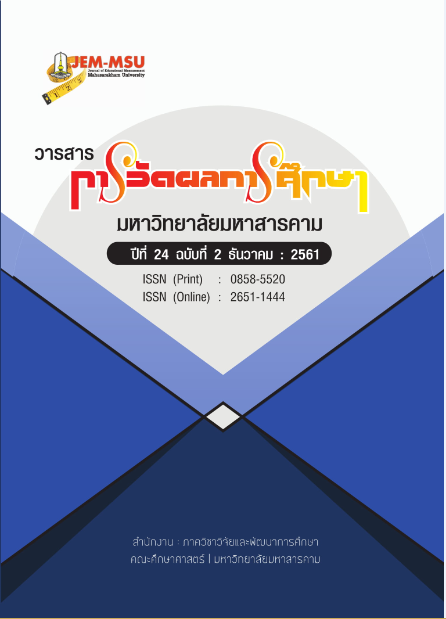A Study of English Speaking Skills and Self-Confidence Using Cognitive Strategies and Compensation Strategies of Matthayomsuksa 4 Students
Main Article Content
Abstract
This study aimed 1) to develop learning activity organizing that promotes English speaking skills with the instructional plans using cognitive strategies and compensation strategies of Matthayomsuksa 4 students that meet the established efficiency criterion of 70/70; 2) to study learning activity organizing that promotes English speaking skills with the instructional plans using cognitive strategies and compensation strategies of Matthayomsuksa 4 students; 3) to study Matthayomsuksa 4 students’ English speaking skills using cognitive strategies and compensation strategies; 4) to study Matthayomsuksa 4 students’ self-confidence using cognitive strategies and compensation strategies. The sample consisted of two groups: 46 Matthayomsuksa 4 students at Buakhao School using the cognitive strategies, and 46 Matthayomsuksa 4 students of the same school using compensation strategies. The subjects for both groups were obtained by using cluster random sampling. The instruments used for collecting the data were 8 instructional plans using the cognitive strategies and the other 8 instructional plans using compensation strategies; an English speaking test and a questionnaire on self- confidence in speaking English. The statistics used for analyzing the collected data were percentage, the mean and standard deviation.
The results of the study were as follows:
- The efficiency indexes of the instructional plans for developing speaking skills of Matthayomsuksa 4 students using the cognitive strategies and compensation strategies were 76.34/74.02 and 76.16/73.70, respectively; which were higher than the established criterion.
- The effectiveness indexes of the English speaking instructional plans using the cognitive strategies and compensation strategies were 0.6023 and 0.5953, respectively.
- Matthayomsuksa 4 students who learned by using the cognitive strategies and compensation strategies had English speaking skills after learning higher than before learning, with statistical significance at the level of .05.
4. Matthayomsuksa 4 students who learned by using the cognitive strategies and compensation strategies had higher self-confidence in English speaking than before learning.
Article Details
The content and information contained in the published article in the Journal of Educational Measurement Mahasarakham University represent the opinions and responsibilities of the authors directly. The editorial board of the journal is not necessarily in agreement with or responsible for any of the content.
The articles, data, content, images, etc. that have been published in the Journal of Educational Measurement Mahasarakham University are copyrighted by the journal. If any individual or organization wishes to reproduce or perform any actions involving the entirety or any part of the content, they must obtain written permission from the Journal of Educational Measurement Mahasarakham University.
References
กรุงเทพฯ : กระทรวงศึกษาธิการ.
กรมวิชาการ. (2546). การจัดการเรียนรู้กลุ่มสาระการเรียนรู้ภาษาต่างประเทศ ตามหลักสูตรการศึกษา
ขั้นพื้นฐาน พุทธศักราช 2544. กรุงเทพฯ : กรมวิชาการ กระทรวงศึกษาธิการ
โรงเรียนบัวขาว. (2558). รายงานผลสัมฤทธิ์ทางการเรียนประจำปีการศึกษา 2558. กาฬสินธุ์ : กลุ่มบริหาร
วิชาการ โรงเรียนบัวขาว.
โรงเรียนบัวขาว. (2559). รายงานผลสัมฤทธิ์ทางการเรียนประจำปีการศึกษา 2559. กาฬสินธุ์ : กลุ่มบริหาร
วิชาการ โรงเรียนบัวขาว.
ธูปทอง กว้างสวาสดิ์. (2549). คู่มือการสอนภาษาอังกฤษ.มหาสารคาม : ภาควิชาหลักสูตรและการสอนคณะ
ศึกษาศาสตร์มหาวิทยาลัยมหาสารคาม.
ประนอม สุรัสวดี. (2539). กิจกรรมและสื่อการสอนระดับประถมศึกษา. กรุงเทพฯ : จุฬาลงกรณ์
มหาวิทยาลัย.
รพีพรรณ พายุหะ. (2553). การพัฒนาทักษะการพูดภาษาอังกฤษโดยใช้กลวิธีการสื่อสาร ชั้นมัธยมศึกษาปีที่ 3.
การศึกษาค้นคว้าอิสระ กศ.ม. มหาสารคาม : มหาวิทยาลัยมหาสารคาม.
สุมิตรา อังวัฒนกุล. (2539). วิธีสอนภาษาอังกฤษ. กรุงเทพฯ : จุฬาลงกรณ์มหาวิทยาลัย.
เสาวภา ฉายะบุระกุล. (2547). วิธีสอนภาษาอังกฤษ. กรุงเทพฯ : ซีเอ็ดยูเคชั่น.
อาภาภรณ์ จินดาประเสริฐ. (2540). การพัฒนากลวิธีการเรียนภาษาต่างประเทศ. ขอนแก่น :
มหาวิทยาลัยขอนแก่น.
อรทัย รัตนสมัย. (2553). ผลการจัดกิจกรรมที่ใช้กลวิธีการเรียนรู้ด้านปัญญาเพื่อพัฒนาทักษะการอ่าน
ภาษาอังกฤษ ระดับชั้นมัธยมศึกษาปีที่ 3. การศึกษาค้นคว้าอิสระ กศ.ม. มหาสารคาม :
มหาวิทยาลัยมหาสารคาม.
Chiya, S. (2003). The Importance of Learning Styles and Learning Strategies in EFL
Teaching in Japan. [ออนไลน์]. แหล่งที่มา : https://www.kochinet.ed.jp/koukou. [สืบค้น
เมื่อวันที่ 19 สิงหาคม 2559].
Le, Trang Thi Huynh. (2006). “Teaching Communication Strategies to Vietnamese Learners of
English,” Dissertation Abstracts International.
Oxford, Rebecca L. (1990). Language Learning Strategies : What Every Teacher Should Know.
New York : Newberry House Publisher.


